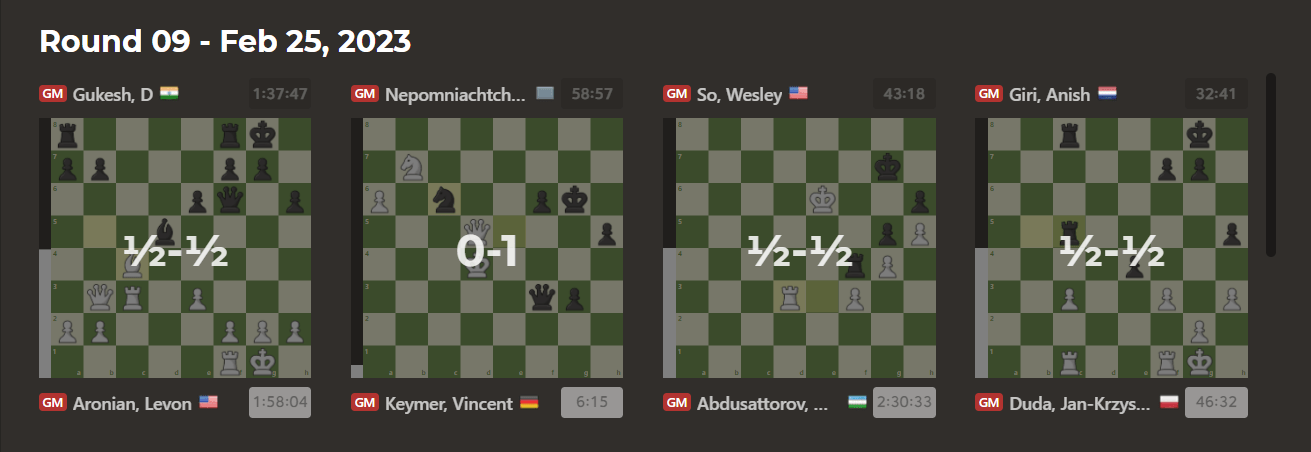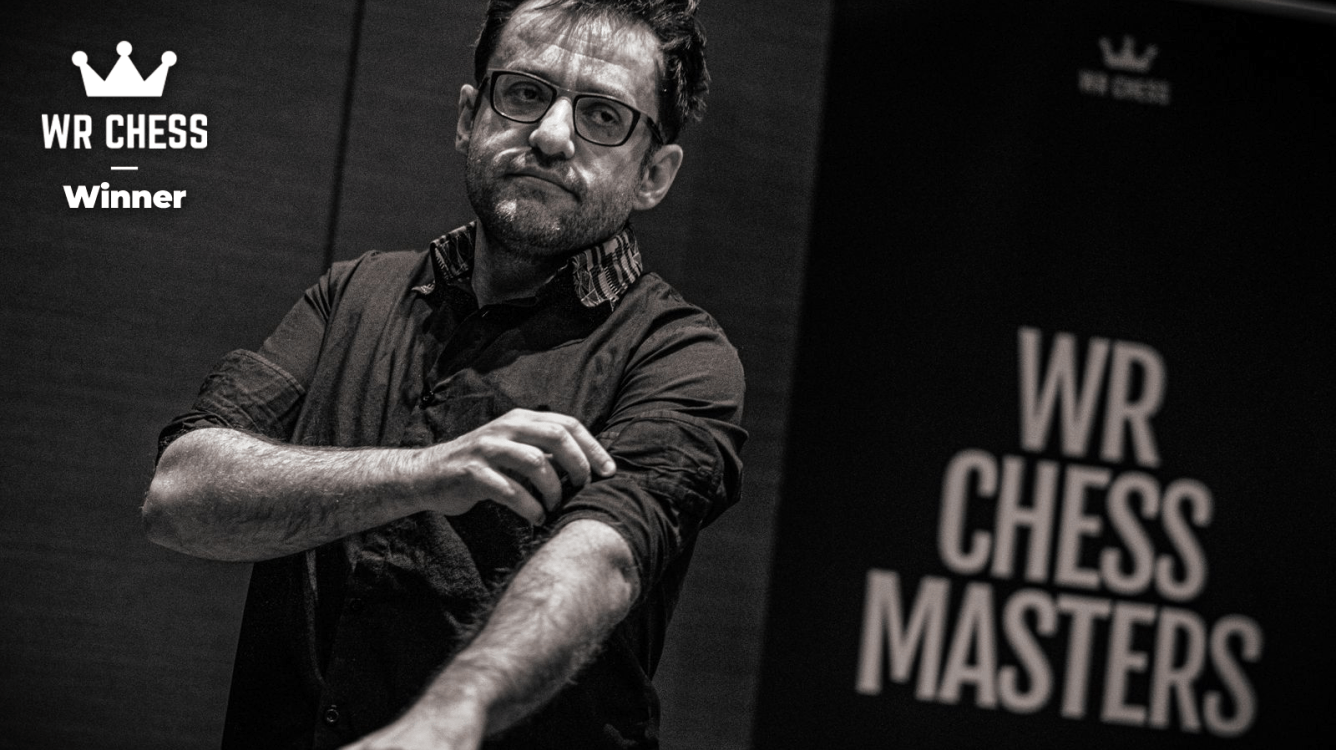
Aronian Clinches 'Tiebreak of Generations' With Perfect 3/3 Score, Wins Inaugural Event
GM Levon Aronian won the inaugural WR Chess Masters 2023 after winning all three games against his co-leaders in the rapid tiebreaks. GMs Gukesh D and Ian Nepomniachtchi finish in tied second-third.
In the classical games, Aronian-Gukesh headed for a quick draw to ensure tiebreaks. With the black pieces, Nepomniachtchi defeated GM Vincent Keymer on demand to jump into a rare three-way tie for first. As a result, this tournament featured the rare instance of tiebreaks between three winners after nine rounds: Aronian, Gukesh, and Nepomniachtchi.
The magic number was 30 in the other games, which all ended in draws. Two of the games ended on move 30. The game between GMs Nodirbek Abdusattorov and Wesley So reached a textbook drawn position on move 30 as well, although it lasted another 39 moves.
Another rare sight: six players tied in last place on -1. Poetically, 64 draws were made in the tournament overall, matching the number of squares on a chess board.
See what happened:
The games of the WR Chess Masters 2023 can be found here.
The most important game of the day in the classical portion was also the fastest finish. Co-leaders Aronian and Gukesh had the opportunity to duel in the final round and win the tournament outright then and there.
In a Queen's Gambit Declined, Ragozin Variation, they completed a threefold repetition on move 18 in a position that has been reached dozens of times—no new moves were played. Thus, tournament victory would be decided by rapid tiebreaks.

The other critical game of the round was Keymer-Nepomniachtchi. The best possible outcome for Keymer was tied second-third, which depended on a decisive game in Aronian-Gukesh as well as So not winning his game. Neither of these dreams would transpire.
Nepomniachtchi still had hopes to win the whole tournament. A victory with Black in this round, especially after Aronian-Gukesh drew quickly, meant that he would join a three-way tiebreak.
In a must-win situation, Nepomniachtchi played the King's Indian Defense against Keymer's timid opening with 4.e3, perhaps playing to avoid the Grunfeld Defense. After 8.b4, the players had an almost new position—just one player rated 1427 had played it before.
The world number-two created an isolated queen's pawn on move 10, a weakness which he would press for many hours on end. The players had a relatively equal position, but Black could poke and prod, and White would defend with no way to force the game to end.

Keymer defended accurately for over five hours, but the decisive error came on move 59 when he pushed his a-pawn—a fatal miscalculation. Nepomniachtchi had a winning position instantly, and as he showed in his inspirational run at the Candidates in Madrid, he did not squander the single chance.
This is our Game of the Day, annotated by GM Rafael Leitao below.
GM R Praggnanandhaa vs. GM Andrey Esipenko made the first draw of their head-to-head matchup. The two previous games they played in other tournaments were decisive, and the players shared an equal 1-1 score after each winning with the white pieces.
Although the opening was a Petroff Defense and the game ended in a 30-move draw, it was sharp after the opening moves. Around move 15, three black pieces seemed loose and at risk of being captured in multiple ways, but tactics kept the position together. The players followed a logical path in the game, however, and the game quickly fizzled out to a draw.

GM Jan-Krzysztof Duda vs. GM Anish Giri, another 30-move draw, featured a fascinating opening wrinkle. After playing a known pawn sacrifice in the Slav Defense, Giri uncorked the novelty 12...h5!. Although the move had never been played, it's the computer's top choice, and the engine even prefers Black slightly in the lines that ensue.
In the game, Giri ended up castling, and he had enough for equality with his activity. If he found the idea of ...Rh6-Rg8, however, Black could have played for a slight advantage. As it was, the players gravitated toward the third draw of the day.
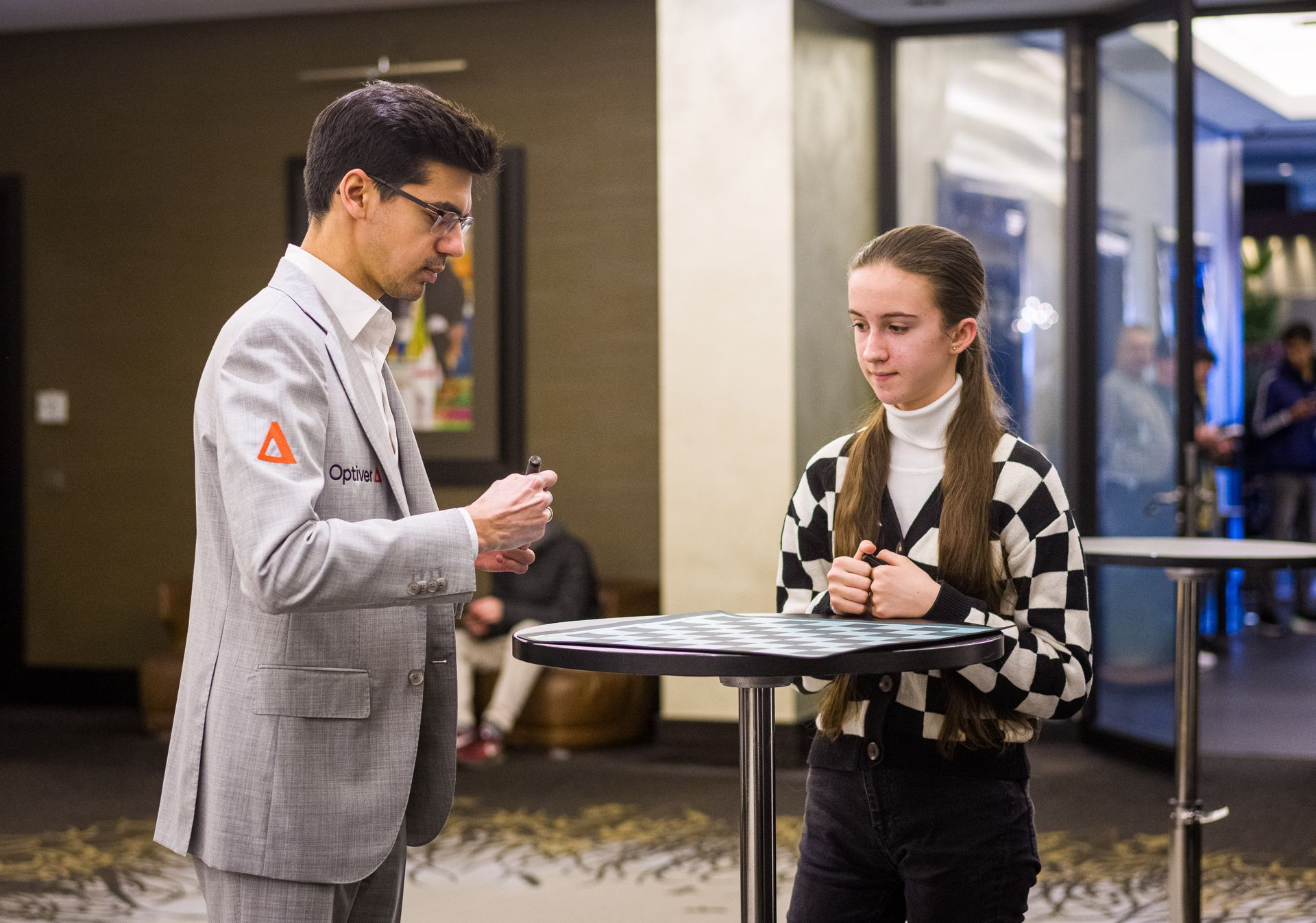
The first game to exceed 30 moves was Abdusattorov-So. Abdusattorov played his fourth and final game with the white pieces on Saturday. He ultimately played two games with 1.e4 and then another two with 1.d4, showing an ambidextrous opening repertoire. This game featured his second Nimzo-Indian in the event.
The Uzbek GM went for the Samisch Variation of the Nimzo-Indian Defense and sacrificed his c4-pawn for the initiative later. He had full compensation for the pawn but nothing more.

The game lasted 69 moves, but one could say it ended on the magic number 30 as well. It was exactly on move 30 that White entered a pawn-up rook endgame. But with three vs. two pawns on the same side of the board, it was an endgame that So had absolutely zero challenges in defending.
Tiebreaks
Three players were perched atop the scoreboard at the end of nine classical games, which is quite a rare circumstance.
The 2015 London Chess Classic saw three winners—GMs Magnus Carlsen, Maxime Vachier-Lagrave, and Giri—and Carlsen ultimately won the tiebreaks. In the 2018 Sinquefield Cup, three players finished in a tie for first without playing tiebreaks—Carlsen, GM Fabiano Caruana, and Aronian. Although not a super-tournament, the 2022 U.S. Senior Championship saw as many as five players tied for first, and GM Alexander Shabalov won the tiebreaks there.
A double round-robin rapid tiebreak was in store to decide the final standings. The games were played at the time control of 10 minutes plus a two-second increment. WGM Anastasiya Karlovich called this "the tiebreak of generations" on the broadcast, with one player representing the young generation, Gukesh, and two players standing for the "old guard" (although they're not that old), Aronian and Nepomniachtchi.
In the first game, Aronian had the white pieces against Gukesh.

They repeated the Ragozin, but Aronian came this time with an opening novelty 13.Nd2!?, unafraid of entering a position where White cannot castle. Gukesh didn't take him up on that kind offer, and after 13.a5?! White had a static advantage once he had built a strong center with f3-e4.
The theme of this game was forks. At two points in the game, Aronian used the white queen to win a pawn with this tactical motif.
Aronian with the black pieces faced Nepomniachtchi immediately after. The game saw a creative (and objectively good) king walk as Aronian raced his king to the queenside with ...Kf8-Ke7-Kd8-Kc8. After that, Nepomniachtchi overreached with 35.Rg8, when he was then lost.
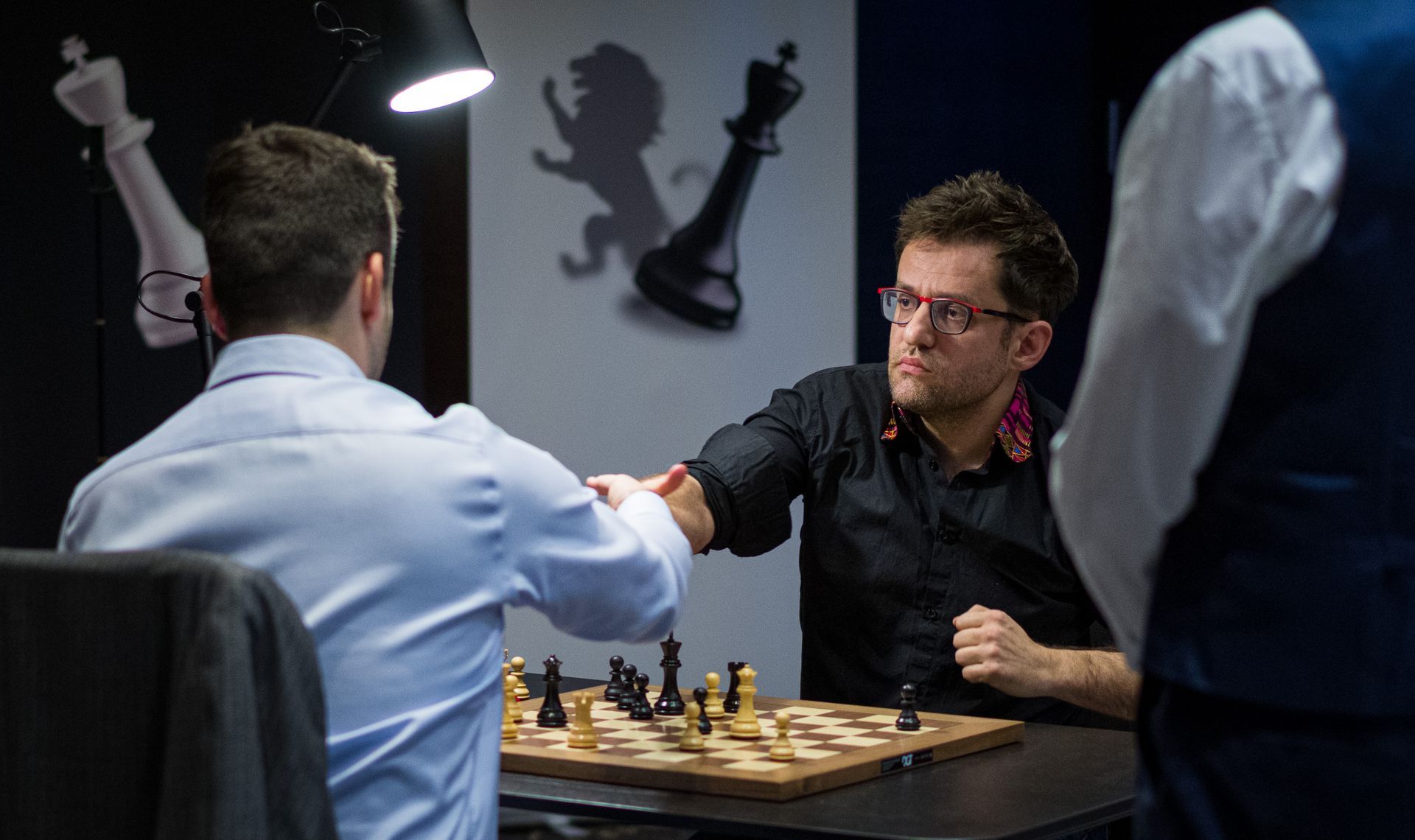
A miracle defense arose on move 44, where White could have saved the game with a startling underpromotion to a knight, but this did not materialize in the game. Black won.
After that, Gukesh with the white pieces defeated Nepomniachtchi. In a time scramble, Nepomniachtchi miscalculated and allowed his opponent to grab a pawn on move 57 with the threat of checkmate, and the game ended five moves later.
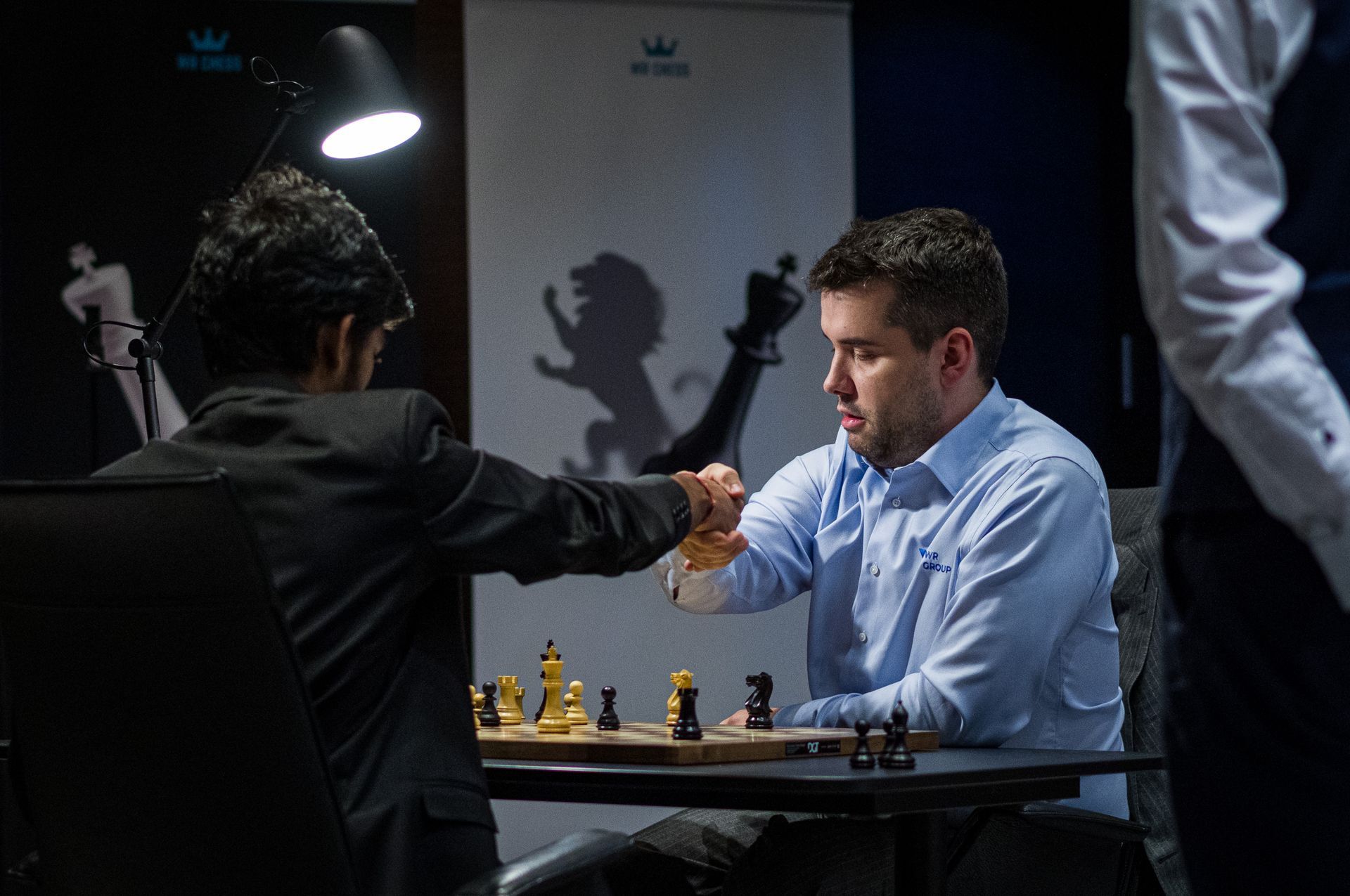
This game did not ultimately have an impact on the final standings after the next game concluded the mini-tournament.
Gukesh-Aronian was a marathon of a game. It was 92 moves long, and an entire separate article could be dedicated to analyzing it deeper.
Around move 50, White faced a nightmarish defense, where the position is objectively holdable, but there is no way to force the end of the game. Aronian showed impressive technique on move 83, where even after capturing the a4-pawn, the win was not trivial.
Aronian showed his class by converting it with seconds on the clock, while your author needed to consult with GM Leitao as well as refer to Dvoretsky's Endgame Manual (chapter 11, diagrams 11-3 and 11-4, for those interested) to understand the technique. A simplified explanation is given below.
The exact same endgame was played in the Olympiad last year, and Praggnanandhaa converted it with the same technique there too.
Aronian won 40,000 euros for his convincing and perfect 3/3 victory. Gukesh and Nepomniachtchi finished in tied second-third without another game, each earning 20,000 euros after splitting the combined prizes of second-third places.

There will be a bughouse event with the top players on February 26 from 14:00-18:00 local time.
All Games - Round 9 & Tiebreaks
Final Standings

The WR Chess Masters 2023 takes place February 15-26, 2023, at the Hyatt Regency Dusseldorf in Germany. The format was a round-robin with 10 players. The time control was 120 minutes for the first 40 moves followed by 60 minutes for the next 20 moves and 15 minutes for the rest of the game plus a 30-second increment per move starting with move 61. The prize fund is 130,000 euros.
Previous coverage:
- Keymer Beats So With Black; Aronian 'Over The Moon With Joy' After Saving Lost Game
- Nepomniachtchi Declines Draw, Topples Leader; Gukesh Jumps Into Tie For 1st
- So Survives Close Call Vs. Aronian, All Games Drawn
- Aronian Cracks Berlin Defense, Leads By Full Point; Keymer Scores 1st Win
- Fireworks In Clash Of Youth, No Blood Spilled In Day Of Draws
- Aronian Slays Sicilian Dragon, Assumes Sole Lead
- Abdusattorov Wins With Greek Gift, Gukesh Triumphs In Indian Clash
- Tactics, Traps, Tricks at WR Masters
